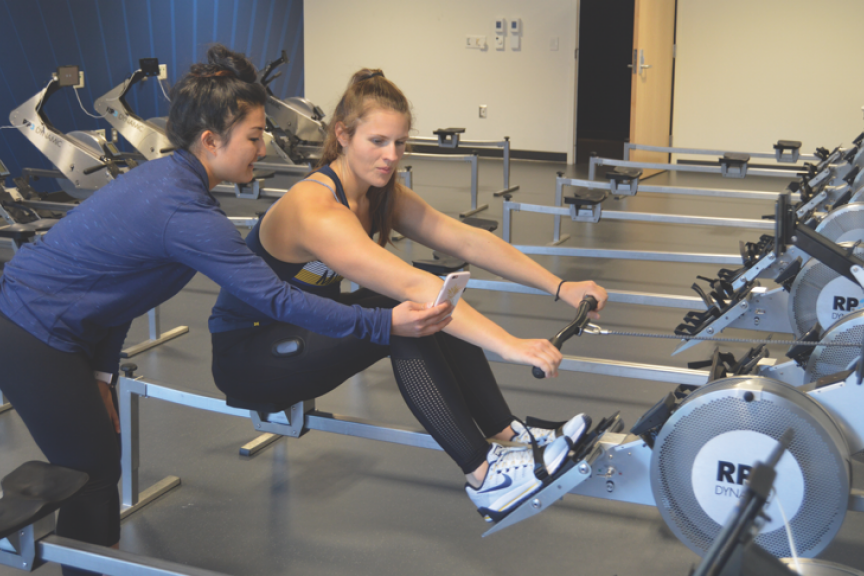
Undergraduate Program

Through our undergraduate program, you'll actively learn about the field through close interaction with faculty, academic advisors, and alumni mentors, as well as internships and professional development activities.
Overview
The Movement Science (MVS) program prepares students for careers in different health-related disciplines, such as medicine, physical therapy, occupational therapy, physical rehabilitation, and biomedical research. The curriculum includes coursework, laboratory research opportunities, and hands-on learning experiences that focus on understanding the control, mechanics, and physiology of human movement. The MVS program emphasizes three disciplines:
- Biomechanics applies principles of mechanics to human movement. Biomechanics courses offer good preparation for graduate studies in biomechanics, ergonomics, prosthetics, physical therapy, or rehabilitation medicine.
- Exercise Physiology focuses on metabolic, hormonal, and cardiovascular responses to acute and chronic physical activity. The curriculum prepares students for careers in health-related fields, as well as for graduate studies in exercise physiology, physical therapy, occupational therapy, and biomedical research.
- Motor Control examines the ways movement is learned and controlled across the lifespan through neural and behavioral mechanisms that include cognitive factors. Motor control knowledge can be applied in physical and occupational therapy careers, as well as other health professions.
Non-Kines U-M students: Considering a cross-campus transfer? Advisor Rebecca Krombeen ([email protected]) can help you find the right program for your interests. You can also check out her slide presentation, Guide to Cross Campus Transfer, at myumi.ch/qgPjW.
Mission
The Movement Science (MOVESCI) major strives to fully develop the intellectual abilities of each student during their learning experiences in the School of Kinesiology. The program emphasizes the study of human movement from biological and behavioral perspectives across the lifespan. The Movement Science program achieves their mission by offering a diversified program that includes introductory and advanced coursework, research, and laboratory experiences. Success is evaluated by the academic and professional placement of graduates.

Program Overview
The Movement Science major comprises coursework that emphasizes the causes and consequences of human movement from biomechanical, motor control and development, and physiological perspectives. The requirements include courses both in and outside of Kinesiology.
The Movement Science curriculum emphasizes competencies in these areas:
- The three areas of Movement Science: Biomechanics, Motor Control, and Exercise Physiology;
- Research;
- Scientific communication, including oral, written, and graphic skills;
- Computer literacy.
Students will gain these competencies by mastering concepts in courses, by exposure to research in laboratory sections of courses and in independent study and research courses.
View the sample curriculum from current and past years in the Forms and Bulletins section of this page, below.
IONM Program
Intraoperative Neuromonitoring (IONM) is a rapidly-growing field that involves the monitoring of the central and peripheral nervous systems of patients undergoing surgical procedures such as orthopedic spinal correction (scoliosis treatment), cranial neurosurgery, and interventional radiologic procedures.
The U-M School of Kinesiology has developed a specialized IONM educational program for Movement Science majors – the first accredited IONM program of its kind in the world. IONM program students will take 12 credits in neuroanatomy, neurophysiology, neuroanesthesia, and a surgical neuromonitoring lab, plus nine credits of clinical rotations over the course of a year.
The first IONM course (MOVESCI 361) is open to all students (most take during winter of their sophomore year). Students learn the IONM application process in the class. For more information, visit our IONM page.
MVS Honors Program
MVS honors students are expected to pursue a rigorous and diversified course of study. Students must complete the regular Movement Science curriculum as well as advanced coursework, independent study, and a thesis during the senior year. Students must maintain a 3.5 GPA throughout the program. For more information, visit our MVS Honors page or contact Dr. Susan Brown ([email protected]).
The School of Kinesiology sponsors or promotes over a dozen groups for students to pursue their personal and career interests. They include the Pre-Physical & Occupational Therapy Club, the Black Undergraduate Kinesiology Association, the Michigan Sport Consulting Group, and Phi Epsilon Kappa (PEK), the co-ed Kinesiology fraternity. List and links to their Maize Pages or websites can be found on the Student Organizations page.
Movement Science Undergraduate Faculty
Our Movement Science undergraduate faculty are leaders in their fields, and have a variety of interests and specialties. View the MVS undergraduate faculty list.
Courses
Sample MOVESCI Course Offerings
- Exercise Physiology
- Human Musculoskeletal Anatomy
- Motor Control
- Exercise, Nutrition, and Weight Control
- Biomechanics
Forms & Bulletins
School Bulletin
- Undergraduate Bulletin 2023-24
- Undergraduate Bulletin 2023-24 MOVESCI Only
- Undergraduate Bulletin 2022-23
- Undergraduate Bulletin 2022-23, MOVESCI Section Only
MOVESCI Documents
MOVESCI 390 Field Experience
MOVESCI 403
Record Sheets
Sample 4-Year Curriculum
View all MOVESCI documents on the Forms and Bulletins page.